#among us bronze
Text

Fanart of Bronze (Bronze belongs to @cutecrewmates-ask-ripcrewmatesau )
25 notes
·
View notes
Note
For Yellow Fever
What do you think about the other crew members?
For Bronze
If you are a good detective, you should know that the imposters are-
*dies before able to tell*
@trippin-chippin
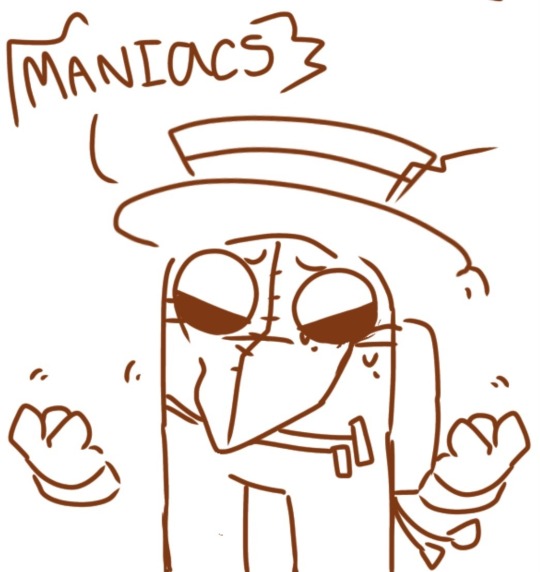
@cutecrewmates-ask-ripcrewmatesau
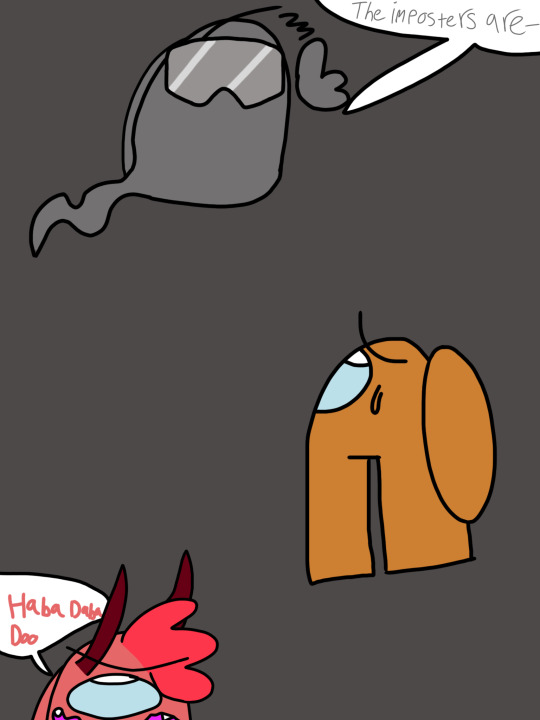
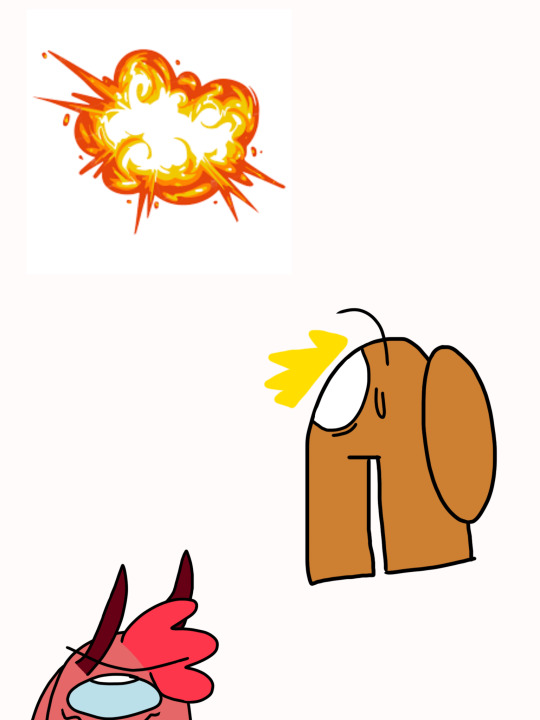
#blabbering#mention#oc’s#among us#my art#au#rip crewmates#trippin-chippin#not my art#meow70 marsmalow#Dani#Bronze#Anon Ghost#Anon#Yellow fever
22 notes
·
View notes
Note
Hey, Ultra Green. How’s it going with the crew?
(Chaos)

#my art#among us#blabbering#au#retrieve au#mention#oc’s#Ultra Green#Aqua#Bronze#Pumpkin#Coco#muted lavender#anon
9 notes
·
View notes
Note
What's Bronze's skincare routine?
(Owksosksosj. This has been in my inbox for more than a month. So I’m just gonna reply without a drawing and just a reply from little Bronze)
Bronze: I- I don’t have a skincare routine…..? Where’d you even get that idea-?!
2 notes
·
View notes
Note

thesis about the sea peoples you say? may i request an infodump about the sea peoples?
Heya!
So, basically in college (undergraduate) I got really obsessed with the questions around the Collapse of the Aegean Bronze Age, mostly because I wanted to set my big Magnum Opus historical fiction novel in that time, and the deeper I dug into the rabbit hole the more it appeared that no one, absolutely no one, actually knows why the civilizations around the Mediterranean all fell from a state of pretty sophisticated internationally-trading civilizations to literal Dark Ages (all except for Egypt which was substantially weakened and never really recovered), all at once around 1200-1100 BCE.
The Sea Peoples are the names of the only contemporary (Egyptian) account we have that names who might have been responsible if this collapse was due to an invasion. It's a popular theory because a viking-style invasion is a much sexier reason for a civilization to collapse so we all gather around it like moths to flame. But the thing is, there's a lot of contradictory evidence for and against and shading that hypothesis.
Suffice to say, literally no actually knows what happened and almost every answer comes up, "Some combination of these things, probably?"
But what makes the Collapse even more interesting from a modern perspective is that if there was a historical Trojan War (and I think there was) as fictionalized in the Iliad and the Odyssey (and Song of Achilles, for the Tumbrlistas), then it would have taken place within a generation of the entire civilization that launched the Trojan War crumbling to dust.
So like, if you're Telemachus, your dad Odysseus fights in the Trojan War, some even manage to get home, and then like... everything goes to shit. Catastrophically. And doesn't recover for 400 years.
Seriously, they lost the written word, like how to actually write things down and read them and it took 400 years to get it back. That's how fucked shit got during the Collapse of the Bronze Age.
So my thesis was asking: what if these two things were related? What if the Trojan War either led to the Collapse or it was part of the Collapse or it was a result of the Collapse? Because the timeline is so unknown and muddled that it really could be any of those and again, that's if the Trojan War isn't entirely fictional (which I don't think it is, but many academics disagree, it used to be a whole thing up until Schliemann dug it up, and many doubted it was ever a historical event even after that.)
Ok, so at the risk of writing 75 pages on this again, let me just say:
My conclusion (more of a hypothesis proposal ultimately since there are so many gaps in our knowledge) was that the Trojan War took place before the Collapse of the Bronze Age. But, it might have been launched in response to a wider breakdown in trades routes and resources, causing the Greeks to launch the campaign basically as a bid to replenish their own coffers because they were getting squeezed by what they didn't know was the first rumblings of a global domino effect.
Therefore, since taking out Troy didn't solve those larger trends and forces, they all went home and then got slammed by the REAL problem, which was all the people who had been displaced from further away by this rolling drought or invasion or whatever that was disrupting these delicate international trade routes.
But the Greeks might have been part of the Sea Peoples too! Our only record of the Sea Peoples is from the Egyptians in a highly propagandistic text which makes them sound like this big fearsome foe but that might have been because saying, "We slaughtered a bunch of desperate refugees at our border who were looking for shelter," didn't sound as cool. If the Greeks (or Achaeans or Ahhiyawa) got swept up in this slow-rolling collapse/displacement of people, then they absolutely could have been among those refugees who crashed against the shores of Egypt.
A lot of my evidence was based on looking at how Troy was sacked (it was stripped literally down the nails and there was a lot of evidence of a long-term siege, like what we read about in the Iliad) vs. how Mycenae (Agamemnon's city) or Pylos (King Nestor's city) was sacked, where they were burned and stuff was stolen but they weren't stripped, it looks more like a standard looting hit-and-run type thing. Which led me to believe that it was different turmoil that rocked Mycenae and Pylos than what led to the sacking of Troy, despite the fact these things happened within about 20 years of each other. (Helen being a made-up reason for a resource-driven war would only be the oldest trick in the book, as far as propaganda goes, after all.)
But really, the craziest detail I'll leave you with is: we just don't know! And then it gets weirder. Because the Hittites fell at the same time so the Hittites scholars say, "Nah, the Sea Peoples weren't Hittites, they were probably Greeks." And the GREEK scholars say, "It wasn't us, it was probably the Hittites or someone else. " and the EGYPTIAN scholars say, "Yeah it was someone north of Egypt, maybe the Hittites or the Greeks." and the LEVANT scholars say, "It wasn't from the Levant, we know what was going on there, it has to be from somewhere else."
Literally every single possible source of the Sea Peoples has the scholars who specialize in that location saying it's not them and it must be the guy next door.
It's maddening!
And then there's a big ol' gap around Bulgaria and the Black Sea because, oh yeah, the Soviet Union forbade archaeology in those areas to quash any local pride so those places that were behind the Iron Curtain are decades behind on scholarship that would allow them to say, "Oh hey, it was actually us! Yeah, the invaders came from Bulgaria and got pushed down by a famine." or something to that effect.
We also have some histories from the time saying that the Sons of Heracles returned not long after the Trojan War to lay Greece to waste! And it's really evocative and sounds like it fits what we've got of all these burned cities that happened right after Troy fell! Except that's in doubt now too!
The latest theory is that it was climate change that led to a massive drought. You can read about it in the latest and most popular book on the subject, 1177 BCE which I highly recommend because if it had existed when I wrote my thesis, I wouldn't have had to write it.
But I disagree with the conclusion! Or rather, I'm skeptical. Because very decade, the problems of the day have been hypothesized as being the cause of the Collapse. Like, in the 60s, there was a theory that maybe it was internal strife around a labor strike, like the French Revolution. And y'know when there's a world war, they think it's an invasion. And there was a theory that it was 'cuz of an earthquake (I think that one is nonsense, Mediterranean civilizations famously bounce back quickly from earthquakes.) And now that climate change is on our mind, I'm a little weary to see that it's the new theory because it feels way too much like we're just projecting our problems onto this giant question mark.
Was climate an aspect! I think so! I think it might have contributed to the break down in trade routes that made everyone in the Mediterranean really stressed out and hostile and warlike and led to a lot of displacement. I'm not sure if it's the only reason though and I think the book just kinda reiterates everyone else saying, "I think it was this but in the end, we just don't know, and it was probably a lot of things." which we've known for ages so it's just repeating all the same conclusions. *sigh*
... Like I said, I wrote my thesis on this so yeah, I could go on for a while lol.
#ancient history#bronze age#collapse of the bronze age#sea peoples#lots of generalizations here for brevity so don't jump down my throat if you are also familiar with this era plz
1K notes
·
View notes
Text
sapphire-hearted (part four)
Aemond Targaryen x f!reader

Aemond is not one who shares those which he thinks belong to him. Including you, as you'll soon find out after an eventful little feast.
themes/warnings: jealous!Aemond, third and fourth parties (but not really), Aemond is a stubborn and possesive arse, drunk Aegon - huzzah!
series masterlist ▪︎ main masterlist
a/n: I can't believe it's been a year since I updated this fiery miniseries! Apologies if I couldn't tag everyone who asked from the previous chapter - taglist is now closed 💙

The necklace is perhaps the most beautiful piece of jewelry you've ever seen.
With an intricate interwoven chain of Valyrian steel, and a sapphire pendant inlaid in a burnt bronze frame that glowed dark green in some lights, the frame displaying carvings that resemble Vhagar's scales.
There is no question to it. Not an inkling of doubt.
This gift is from Aemond.
"You simply found this when you arrived?" you asked your lady-in-waiting, as you pick up the necklace from its velvet casing and study it against the faint firelight in your chambers.
"Yes, my lady," she responds promptly. "Shall I fasten it upon you before you depart for the King's feast?"
Your mind forms almost immediately, resolute in your decision. "No, it will not be of any use to me this night. You may keep it away in my boudoir."
The thought of it around your neck is a pleasant one, to be sure. It is such a thing of beauty, fit to be worn to a royal gathering. But what message might it signal to the others?
What purpose might it serve - especially to Aemond - that you wear something that symbolises him?
All while your companion is Ramsay, with whom you hope to be betrothed.
And while Alys is likely draped upon Aemond's arm. That slimy, bastard witch.
You will not give in, and give him what he wants.
The necklace is far from enough to make up for how he has wronged you, so it stays in your chambers, safely tucked away in its casing, not to be worn until Aemond sets things right.
If he ever will.
Ramsay arrives at your door soon enough, accompanied by two of Aegon's guards. The awe in his gaze as he takes you in is so evident, so pure in its apparent innocence. Unlike Aemond's, who would be undressing you with a single passing look.
Unlike Aemond's, who - despite his trangressions - looks at you like he would burn the entire Seven Kingdoms for your hand.
But he has relinquished your hand when he took that witch to bed.
"You look dashing as ever, my Lord," you curtsy in greeting, as Ramsay kisses your hand. He is clad in a tunic in House Beesbury's yellow and paly black, as you are wearing a gown in your own House's hues.
If not the necklace from Aemond, branding you as his, why not something of Beesbury? It would anger Aemond so, but you are feeling petulant. Why can't you take a jab at him after what he had done?
"And what a lovely sash you wear," you say, observing his attire. "Mayhaps I might display this on my person? Have it as a sort of attachment upon my skirts? I would be proud to have everyone at the feast know that we have come together."
"Of course! I would be honoured, my lady." He immediately relinquishes it, handing it to your lady-in-waiting, who then fastens it around your waist. The colour is striking in contrast. The piece of cloth surely will not go unnoticed.
You make your way through the Red Keep, your arm entwined with Ramsay's. Sounds of the revelry make themselves heard as you near Aegon's private dining hall.
As the guards open the doors, you hear your names announced. Almost all the attendees are already sat around the table. Aegon and his host of sycophants, particularly Lord Reyne and Lord Estermont. Helaena and her lady companions. Tyland Lannister and his betrothed. Even Ser Criston Cole, who has never been one to partake in merrymaking, usually standing guard in the corner. There are some others whose names escape you, as you find your seats - among the last ones which remain empty, right next to Aemond and Alys.
"Welcome, dear lovely guests, welcome!" Aegon walks over to you, already on his fifth or sixth goblet of firewine. "Please find your seats, have a drink - or seven drinks, preferably, and... oh! Isn't that something, my lady? Beesbury yellow?" Not giving mind to any boundaries, he toys with the sash tied around your waist.
Aemond twists around in his seat, catching sight of you for the first time.
His pupil dilates considerably, with a single glance at your face, then down to your décolletage... where the necklace is nought to be seen.
What he sees, raking over your figure, is that sickening shade of bright yellow. That Beesbury sash tainting the beauty of your gown.
Tainting the woman who is rightfully his.
His hand instinctively goes to the scabbard in his belt, though his sword remains in his chambers. It matters not, he can just as easily demand one from the Kingsguard.
Because the rat who calls himself Ramsay has surrendered any desire to stay alive.
"So... you here," Aegon guides you to your seat, with his arm loosely draped around your waist. "And you right there," he adds to Ramsay.
If you didn't know any better, you'd think the seating arrangement is accidental. But you know Aegon - he surely planned it to be Ramsay, you, Aemond and Alys beside each other.
Aemond openly stares at you as you settle down to his left.
"My Prince," Ramsay greets from your other side, "Lady Alys."
"Oh, it's just Alys, m'lord," she clarifies, unabashed. "I am no Lady. I am simply here at the behest of my dear Aemond."
"Prince Aemond is fortunate to have you as his companion, Alys," you smile sweetly, concealing any ire you might have. "As I am fortunate to have Lord Beesbury by my side."
Alys nods, raising her cup to you. To anyone, it's an innocent enough gesture, but you see her up close, and you see into the depths of the witch's gaze. She knows about you and Aemond, of course she does.
The attention of your companions are diverted, and Aemond wastes no time in leaning closer to you. He grips your thigh underneath the table, away from any prying eyes.
"My love," he purrs, "you never fail to take my breath away. Although I never thought you would sully yourself by wearing that. I trust you received my gift?"
You cross your legs so that his hand falls off, but it doesn't faze him. He simply finds purchase yet again, this time digging harder into your flesh. So warm, it almost feels as if your skirts do nothing to prevent his encroaching touch.
"Hmm, don't test me, now," he warns, lips curling back in annoyance. His tone is so deep you feel the heat pooling in your core.
"I could say the same to you," you counter. "Do not lay a hand on me, my prince. Especially not in the presence of my betrothed." You push his hand away, and he relents for the moment, reaching for his goblet and downing its contents in one angry swig.
"And by betrothed, you must mean that you have reconsidered my proposal and agree to be wed to me, your only love," he says, daring you to challenge him.
"You are mistaken, Aemond," you respond coolly. "I do appreciate the necklace. It is a marvel, indeed. But there is a reason why I don something of Lord Ramsay's instead of it. I am not yours. I feared the message it would send were I to wear the necklace to this feast."
"What message, my love? The truth? That you are mine and mine alone?"
"That is finished - "
"If you value Lord Beesbury's life by any small measure, you would not speak to me of such vile ideas. He will not have you, lest he wishes his head to no longer rest upon his shoulders."
"Resorting to threats now, are we?" you spit venomously. "You will not harm him. Or I swear to you on my mother's memory that I will never speak with you again."
That shuts him up. He exhales deeply, weighing your words, studying your expression. He wants to fight back and to call your bluff, but it is no use. His gaze is drawn down to your lips, and he moves closer just an inch, his own lips parted in longing and torment.
"Well, it seems we may have more cause for celebration!" Aegon bellows from the head of the table, with a grinning Ramsay standing by his side. You tear your attention away from Aemond, but he lingers on you, until his brother calls out for him. "Aemond! You must have known about this, dear brother, as I understand you and the lady have always been close."
The guests share glances, already assuming what the news might be, but none of them say a word for fear of their Prince Aemond.
"Iderēbagon aōha udra sȳrī, lēkia." Choose your words wisely, brother, Aemond warns him. The mood of the entire room shifts, as it inevitably does whenever Aemond speaks.
"Oh come now, none of that!" Aegon groans, drunk and unamused. Nothing will bring his spirits down, not even his far more intimidating younger brother. "These are happy news. Something about a successful betrothal, I hear?" he declares, nudging Ramsay to make the announcement.
Ramsay locks eyes with you, and you manage to give a stiff smile, aware of the simmering rage of the one seated beside you.
"Allow me," Aemond stands, raising his cup to the entire table.
"Even better," Aegon shrugs, "you have always been excellent at dinner proclamations, lēkia." Brother, he addresses Aemond, his own Valyrian disjointed and careless.
Aegon sits back down and raises his cup. A confused but still smiling Ramsay returns to sit next to you.
Ramsay hurriedly tells you, "I was hoping to share the news myself, my lady, but - "
"Do I not have your attention, Lord Beesbury?" Aemond interrupts.
"O-of course, you do, my prince," Ramsay stammers, reaching for his cup with shaky fingers. You take notice and place your hand atop his to provide comfort.
Someone else takes notice, unfortunately.
"A toast," Aemond voices clearly, and a hush falls over the room, "to a new betrothal."
"Hear, hear," Aegon responds, taking a sip of firewine and waving for the others to do the same.
But Aemond is not finished just yet. "We are not often afforded the privilege to marry for love, and that is what makes this union so exceptional."
You stiffen in your seat, dreading the next words that you know will come out of his mouth. For you know him so well. You know Aemond's design.
"It is an honour to take my love to be my wife," he raises his cup as he gestures to you, and you swear you could hear a pin drop in the deafening silence that ensued. "She is already the keeper of my heart, so the ceremony will only be a formality. But I shall take her as mine in every way that I can. In front of the old gods and the new."
You are unable to drop Aemond's gaze, unable to see the look of betrayal Ramsay is giving you.
"Hear, hear," Ser Criston offers, in an attempt to cut through the tension.
Aegon releases a fit of laughter, prompting his fawners to follow suit.
"Seven hells!" he exclaims. "More wine, more wine for all!"
Aemond rushes to you, pulling you out of your chair, not paying mind to anything or anyone else.
"Come with me," he commands, his fingers tight around your wrist.
You feel powerless as you let him herd you away from the table and out of the hall.
"Oh, would you look at them!" Aegon practically squeals, and calls after you, "It is customary for the bedding to be after the wedding, you two! But then again, who fucking cares?"

taglist: @immyowndefender @bellameshipper @aemondswifeisme @bash1018 @fuck-the-reaper @shessthunderstoms @aemondsbabygirl @melsunshine @youtoldalie @snh96 @noxytopy @ellooo0ooo @brianochka @not-a-glad-gladiator @mac95650 @whitejuliana1204 @midnightmystic @saminalloxo @oh-no-tia @magnificentsapphiresoul @clara-geekhime @mariaelizabeth21-blog1 @ananas26t @iloveallmyboys @carriellie @summerposie @verycollectivecreator @toodlesxcuddles @brie-annwyl @dc-marvel-girl96 @bellstwd @bibli0thecary @happinessinthebeing @magnificentsapphiresoul @rorawinters @targaryen-madness @hanula18 @rhaenattargaryen @an0ther-us3r @sugurubabe @theshatteredideal @let-love-bleeds-red @s-we-e-t-t-ea @mydemimonde @the-intjs-dark-academic @heavenly1927 @anehkael @minttea07 @barnes70stark @cheneyq
#aemond targaryen#house of the dragon#aemond targaryen x reader#aemond targaryen imagine#ewan mitchell
643 notes
·
View notes
Text
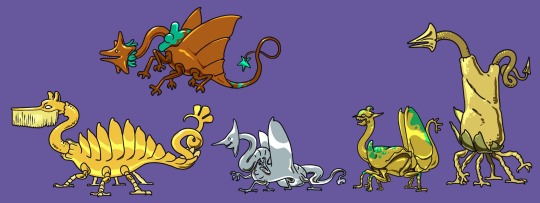
Lineup of metallic dragons, as they appear in my personal setting. From left to right:
Gold: Among the largest and most politically ambitious of dragons. They rarely use their immense might to seek dominion over humanoid races, instead investing their First hoard (typically sea-jewels and their own shed scales) in the success of kings and cities that answer only to them, thus expanding their own wealth through mercantile success. Their wisdom spans generations, making them valuable advisors and patient strategists.
Copper: A mid-sized dragon, and the most playful. Their fascination with humanoids lies almost exclusively in how they entertain themselves. These glittering tricksters make their lairs in the hearts of theaters, theme parks, circuses, and other locales of escapism, stretching and bending the laws of reality to the awe and delight of their audience.
Silver: The smallest and most ephemeral of dragons. Though solitary among their own as all dragons, they are fascinated by the social lives of humanoids. They may spend a majority of their lives playing pretend as ordinary folk, using their silver tongues and seemingly inexhaustible work ethic to worm their way to the top of a corporate ladder or the heart of a secret society, only to leave it headless when the game is won and they seek a fresh start elsewhere.
Bronze: Smallest after silver, and cheeriest of dragons, perhaps because they remain the closest of their kin to Mother Sea, from whence the first dragons are said to have crawled. Likewise their motivations seem the most simple: to create paradise at these sacred shores. They are lorded as guardians of beaches and shallow seas, yet their vision of perfection may prove so infectious that those who visit forget the world beyond the gentle surf and glittering sand, and those who are wrenched from it find Elsewhere hollow by comparison.
Brass: The tallest, and loneliest of dragons. These flightless behemoths roam the desert in their youth, taking in everything from the goings of the skittering beetle to the rise and fall of cities. But over centuries they grow so tall they can no longer interact intimately with the many subjects of their interest. Instead they totter aimlessly from place to place, magically broadcasting their vast repository of histories, biographies, and opinions on the weather to anyone who might be there to listen.
796 notes
·
View notes
Text

These Destined Ends
Part 1
Summary: Jessica fulfilled the wishes of the Bene Gesserits to produce a daughter. You’re now burdened with the task of not only marrying the na-Baron, but also bearing his child — the Kwisatz Haderach. Will you take your fate into your own hands? Or will it always belong to those who control you?
Pairings: Feyd-Rautha x F!Reader
Word Count: 2.1k
Warnings: none for this chapter. Masterlist of warnings overarching the series
A/N: Hello! If you’re here then there’s probably something wrong with you too, so let’s be friends. I haven’t been able to write anything lately until I saw the latest Dune movie and then all of my thoughts became dedicated to Feyd-Rautha. I must get these thoughts out. Help. Me.

“Chin up.”
Your mother brushes your hair back, bronze, like hers, and lifts your chin. Her gaze is critical. You stare back, thinking only of the things that she will find fault in you. An endless amount, you muse. The slightest flicker of expression on Lady Jessica’s face informs you that she suspects what you’re thinking. Your teeth grit.
“Must you do that?” You hiss through your painted lips. The servants have dressed you specially for the occasion. A floor-length black dress and, settled on your shoulders, a red cape clasped together with the House of Atreides insignia.
Jessica withdraws her hand. Your mother radiates femininity and power, a feat you’ve yet reached. Even the cool way in which she regards you drips with regality.
“Do what?” She asks, feigning innocence.
“Don’t make me say it.”
Jessica’s blue eyes harden. “You don’t have to, daughter. It’s plain enough.”
Mother and daughter stare at one another.
She tried to teach you the ways of the Bene Gesserits, but you failed to take to it. You were too expressive, too…volatile. You struggled to detect the slightest change in voice, you could never sit still long enough to study, and your facial features always betrayed you. The only aspect you succeeded in was combat — there was no need to mask your feelings, your thoughts, able to just completely lend yourself to the blade.
But it wasn’t enough.
“You’re fortunate the Reverend Mother has chosen to see through with this arrangement,” Jessica all but snarls. “There’s hope for you still, in form of an heir.”
The Kwisatz Haderach.
The only reason your mother still spoke to you, affords you any attention at all. The fact that you’ve been painstakingly bred to produce him: a Bene Gesserit of male origin, capable of accessing the memories of his ancestors and see through time and space itself.
A terrible mantle for an unborn child.
In the black of night, you sometimes lay your hand on your abdomen and utter apologies to the egg nestled in your ovary; burdened with horrible purpose. If only you could avoid its fate. But you were not even in control of your own.
“I want to stay here,” you plea finally, pitifully.
Jessica steps away from you, brushes off her skirt. “You know that you cannot.”
“I can help Father,” you insist. “You know that he worries about gaining the approval of the Fremen. I can —”
“Enough!” The Voice. It snaps your mouth shut and renders you mute. “This is bigger than both of us.” Jessica snatches your upper arm, pulls you close enough to feel the heat of her anger. “Your father wanted a son. A heir. But it was my duty to produce a daughter. I ignored the pleas of your father because I understand what it is to serve. Don’t make me regret my decision.”
You swallow your disgust, though it lingers like a foul taste on your tongue.
This isn’t the first time that your mother has told you this. Nor did you think it would be the last.
Perhaps making a home among your enemies would be better than staying here among family.
“Fine,” you say. You wrench your arm from her grasp then turn away. It’s futile, you know the heighliner will be here soon to whisk you away, but you can’t stand to be in the presence of your mother any longer. Fortunately she lets you go.
You’re not even aware of where your feet are taking you until the familiar sound of the baliset meets your ears. Gurney rests lazily on the ground in the massive corridor, back against the wall and string instrument in his scarred hands. He doesn’t look at you as you approach nor when you collapse down beside him.
Usually Gurney’s situationally appropriate songs bring you a modicum of comfort, but today it seems more ominous than insightful.
“I won’t miss your singing,” you say.
He stops playing. “You jest.”
Playfully, you crack open one eye and peer at his baffled expression. You try not to laugh. “I don’t.” A sigh escapes your mouth then, and you slump further down, uncaring if you rumple your gown. “I will, however, miss the singer.”
“Don’t bother appealing to an old man like me. It won’t get you anywhere.”
“Hm,” is all you say, lost in thought.
Gurney sets the baliset to the side. His hand finds your knee and he squeezes. “You will be fine, Lady Y/N. I’ve taught you well.”
“Not even what you’ve taught me will suffice for what I’m up against.”
“Nonsense.”
Both eyes open now, you stare pleadingly at the swordsmaster. “Just come with me. Please.”
It’s Gurney’s turn to sigh. With a groan he heaves himself to his feet and offers you a hand. “You know that I can’t,” he murmurs.
His loyalty to your father doesn’t extend to you.
He is Leto Atreides, Duke of Arrakis, after all. And you are just his daughter. A pawn. A womb and nothing more.
You reach out to ghost your fingers over the scar on Gurney’s cheek. “Tell me about them.”
The Harkonnens.
“There’s nothing you don’t already know or haven’t learned from the filmbooks,” Gurney says to you in a terribly soft voice. It’s unfitting of the great soldier. “They are a cruel people. Do not trust them.”
You nod, irrationally devastated that your final plea to Gurney did not work. But his words were not anything new.
Nothing you learned about the Harkonnens has been pleasant — from their oppressive rule and misogynistic society down to their industrialized homeworld. Your chest aches.
First you were forced to leave the lush beauty of Caladan for Arrakis. You had even grown admittedly fond of the desert planet, just to yet again be snatched from another home.
“Thank you, Gurney. For everything.”
He dips his chin in acknowledgment, then holds out his arm for you to take.
Gurney has been like a second father to you over the years. While Leto was out securing political alliances and holding meetings, it was Gurney who kept you company. He aided in your combat training and believed in you when no one else did. To lose him would be to lose a great friend, indeed.
By the time you return to the antechamber where you’d been, Leto has arrived. He looks as cunning and handsome as ever, and the smile he flashes you is enough to cut you to the bone.
If what Jessica said was true about your father wanting a son and being sorrowful he did not get one, you would never know. He has only ever made you feel loved.
“My beautiful daughter,” he greets you. He smells wonderful. The same way he did all of those years ago when he would tell you stories of your grandfather and tuck you into bed, his beard tickling your cheek.
You breathe him in for one of the last times. “Hello, father.”
“You look marvelous,” he says. His smile falters slightly. “Are you ready? I wanted to ensure that you’ve said your goodbyes before we leave.”
Bitterly, you think, Before I leave. Everyone else will return to Arrakis and you will be moored on Giedi Prime, married to a bloodthirsty monster and forced to grow round with his child.
The thought makes your knees tremble.
The Harkonnens controlled the fiefdom of Arrakis before your family and were unbelievably outraged that it, and the flow of spice, had been stolen from them. You couldn’t even begin to imagine what your reception on their planet will be like. It’s any luck if you don’t get slaughtered upon arrival.
Especially since the Baron’s nephew, the na-Baron Feyd-Rautha — your betrothed — was known for his brutal nature. You hoped stupidly that the arrangement of marriage and promise of an heir would be enough to keep you alive.
At least for awhile.
Feyd-Rautha killed his own mother. Who knew what the status of wife meant to him?
“I’m ready as I’ll ever be,” you answer Leto. He squeezes your hand.
You hug Gurney goodbye then board onto the heighliner after your parents. It’s difficult to suppress the tears threatening to fall as the ship takes off in a flurry of sand and departs.
Normally you’d be completely enraptured with the endless golden dunes, but today you stay rooted to your seat and refrain from crying.
The flight to Giedi Prime happens much too quickly for your liking. Already your heart is in your throat, hammering out your nerves in a steady rhythm.
The view from your seat reveals the strange nature of your new home — a black sun. Never again will you see the stretch of blue sky from Caladan or feel the formidable heat of Arrakis. The entire world outside the ship stood in sharp black and white contrast, all color drained from the surroundings and its people.
You spy hoards of Harkonnens gathering beyond the ship, awaiting the arrival of the na-Baron’s wife and their future Baroness.
Your stomach churns. How could you ever lead such ugly, wicked people?
Jessica’s voice engulfs you. “Chin up,” she says again to your dismay. “You mustn’t show any weakness. Not here.”
You raise your chin the slightest amount. Jessica nods stiffly in approval, and it’s in that moment you understand that your mother’s harshness has been preparing you for this. While you hardly feel the urge to forgive her, an odd sense of calm washes over you.
You are an Atreides. And you always will be.
No one can take that from you.
The boarding ramp disengages and you’re the first one to step onto it. A hush of silence befalls the crowds.
You stride forward with as much confidence as you can muster, focusing not on the leering eyes of the Harkonnens but instead on the Baron’s fortress. A large pathway separates you from it, granting you plenty of time to get your fill. It’s as grand as it is excessively boastful; tall, pointed towers cleverly connected, all sharp lines and edges. It leaves the impression of a finely crafted dagger.
A display of power and wealth.
Behind you your parents emerge and the carefully observant crowd launches into disarray — shouts and yells of anger, of hatred, grate your ears. You know that they take it in stride, however, and their strength fortifies your own.
By the time you’ve crossed the distance from the heighliner to the inner walls of the fortress, your eyes are blurried by the strong contrast outside now given away to darkness. It takes a few moments for you to adjust. When you do, you quickly look over your surroundings.
There’s few decorations or art. It’s cold and impersonal and extremely clinical.
Your slippered feet reverberate off the high ceilings.
Bracing yourself, seemingly, has been for no reason. For it’s not the Baron and his nephew that meet you but rather a line of Harkonnen soldiers. Their faces are stoic.
You bristle. “Where is the Baron? And my betrothed? Do they not wish to receive us?”
The soldiers do not answer.
A man appears then from down the hall, a Mentat by the look of him. He’s pale and bald and clad in black like the other Harkonnens.
“My apologies, Lady Y/N,” the Mentat says. “My name is Piter de Vries. I am here to escort you. The Baron and na-Baron will receive you now in the throne room.”
Leto lays a hand on your arm as if to stifle your response. “Please, Piter, lead the way.”
You can’t help but glance curiously at your father. This entire situation was delicate, you knew, but you wonder at his subservience. It’s an insult not to be immediately greeted by their hosts, especially when your guests happen to be the Duke of Arrakis, his concubine, and their daughter. If Leto agrees with this affront, though, he doesn’t show it.
Leto simply strides after Piter with you and your mother in pursuit.
The fortress boasts sleek walls and floors, polished to perfection. Piter guides you to the throne room a short distance away, the sight of it stealing the breath from your lungs. It’s larger than any room you’ve seen before, outfitted on the far side with steps leading up to a grand dais.
And upon the dais, demanding your attention, is Baron Vladimir Harkonnen. The man is as large as the throne room itself but not nearly as impressive, pale and beastly, his enormous weight supported by suspenders. He makes no movement as you enter.
Your gaze moves quickly, eagerly, away from him.
Standing on either side of the dais are his two nephews. Aware that you can’t stand to face your betrothed yet, you fix your attention on his brother. Rabban, you recall his name.
Rabban is bound with hard muscle and swathed in what you can only describe as thinly veiled anger. At his side, his fists clench and unclench restlessly.
Then, without permission, you look to your future husband.
Feyd-Rautha stands as tall as Rabban but roped instead with lean, attractive muscle. His brow sits above dark eyes and a generous mouth. There’s a frightening intensity to the way he stands, encapsulating both nonchalance and a dangerous arrogance. Clearly this man is used to getting his way and will stop at nothing to do so.
And it’s this man that makes no effort to disguise the way he studies you, starting at the top of your head and trickling languidly downward.
A chill dances down your spine.
When he catches this, catches you watching him — he must’ve known that you were — his lips twitch into the faintest of smirks.
Part 2
559 notes
·
View notes
Text
To Ares
One of my favorite Homeric Hymns because of how unusual it is. It serves to remind us that Ares is a protector, a leader, and a guide.
Supremely strong Ares,
golden-helmeted chariot-rider,
tough-hearted, shield-carrying
guardian of cities,
bronze in armor, brave of hand,
the tireless, spear-sharp
rampart of Olympos,
father of war-winning Victory,
the ally of Themis.
You are a tyrant to the rebellious,
a leader to the most just,
you carry the staff off manhood,
you whirl your disc of bright fires across the sky
among the seventh tracks for the constellations
where blazing horses bear you forever
beyond the third orbit.
Hear me, helper of mortals,
whose gift is the courage of youth.
From high above, shine down upon our lives
Your gentle light and your warrior’s power,
so I may drive away bitter cowardice from my head
and subdue my soul’s beguiling impulse,
so I may restrain the shrill rage in my heart,
which excites me to charge
into the chilling din of battle.
Rather, blessed god, give me the courage
to stand my ground within the safe laws of peace,
shunning hostility and hatred
and the fate of a violent death.
Translation by Jules Cashford. From 4th or 5th century Roman Empire.
226 notes
·
View notes
Text
Some Art Vocabulary

Abstract - Simplified, intended to capture an aspect or essence of an object or idea rather than to represent reality.
Amber - Tree resin that has become a fossil. It is semi-transparent and gem-like. Amber is used in jewelry today as it has been for thousands of years.
Amulet - Object, organic or inorganic, believed to provide protection and turn away bad luck. Amulets were often worn as jewelry in antiquity.
Anneal - To heat metal to make it soft and pliable.
Black-figure - Technique of vase painting developed in Greece in the 7th and 6th centuries BCE and adopted by the Etruscans. Figures are painted on a reddish clay vase in black silhouette and details are then cut away with a sharp point down to the red below. Sometimes artists added additional colors, especially purple-red and white.
Bronze Disease - Corrosion of a bronze object that cannot be permanently stabilized. Without special care, an object with bronze disease will continue to corrode.
Bust - Portrait of a person including the head and neck, and sometimes the shoulders and part of the chest.
Cameo Glass - Glass produced by layering two or more colors of glass. Generally, an upper layer of white stood out against a contrasting lower background, usually blue.
Cameo Stone - Hard stone, such as agate, naturally layered with bands of color. Artists took advantage of the layers to carve figures or decoration from an upper layer (or more than one), leaving a background layer of a different color.
Cast - To make in a mold from liquid metal. A cast object can be hollow or solid.
Chasing - Technique of adding definition and details to an image or design on metal from the front using blunt and sharp tools.
Conservator (of antiquities) - Professional responsible for preserving ancient objects and materials. Conservators usually have a general knowledge of chemistry and of ancient art-making practices and are often specialists in one material. Among many other responsibilities, they conduct technical and historical research and oversee preventive care such as climate control.
Contrapposto - (”opposite” in Italian) Pose of a standing figure with most of the weight on one leg and the other bent. This causes hips, shoulders, and head to shift in order to balance the body. One arm is often higher and one lower.
Emery - Hard, dense rock rich in corundum, found easily on the Cycladic Islands. A powerful abrasive for grinding and smoothing other stones.
Encaustic - Technique of painting using colored pigments mixed with wax. The waxy mixture was worked with a tiny spatula.
Gild - To apply a thin layer of gold foil or liquid gold (gilt) to create the look of solid gold.
Iconography - Study of and use in art of repeated images with symbolic meaning.
Incise - To press or cut into a surface (stone, metal, clay, wood) with a sharp tool to write text or create fine curving and linear details.
Inlay - To decorate an object by inserting a piece of another material into it so that it is even with the original surface.
Low Relief - Method of carving figures or designs into a surface so that they are raised slightly above a flat background.
Mosaic - Technique and type of artwork. The technique is to arrange cubes of stone, glass, and ceramic to form patterns and pictures in cement, usually on a floor. The artwork is the final story or decoration made of cubes.
Mummification - Process of preserving a body by drying it. The Egyptians removed internal organs and put natron, a natural mineral mixture, on and inside the body. This absorbed moisture and prevented decay.
Palmette - Stylized palm leaf used as decoration in ancient Greek and Roman art and architecture.
Pentelic - From Mount Pentelicus, near Athens. An adjective that mostly refers to the beautiful white Greek marble marble in its
quarries.
Portrait - Image of a person, usually the head and face. Some portraits include part of the chest or show the whole body. The image may closely resemble a person or emphasize, idealize, or invent characteristics.
Repoussé - Technique of raising the outline of a design on metal by repeatedly heating and softening the metal and pushing the desired shapes into it from the back with a blunt tool.
Sarcophagus/Sarcophagi (pl) - Stone coffin, often decorated on the sides with mythological scenes carved in relief, sometimes with the image of the deceased person or couple on the lid. Used in Imperial Roman times from the early 100s into the 400s CE.
Stele/Stelai (pl) - Upright stone or wooden slab or pillar used to honor a person or mark a place. Often an inscribed grave marker or a boundary stone. (Also called stela/stelae.)
Syncretism - Blending of elements of different cultures, often resulting in new imagery or new interpretations.
Tessera/tesserae (pl) - Pieces of stone or other hard materials cut into squares or cubes to make mosaic art.
More: Word Lists ⚜ pt. 2
#art#terminology#word list#writeblr#dark academia#writing reference#spilled ink#literature#writers on tumblr#writing prompt#poetry#poets on tumblr#writing inspiration#creative writing#light academia#langblr#linguistics#jan matejko#romanticism#writing resources
245 notes
·
View notes
Text
April 13, Xi'an, China, Shaanxi Archaeology Museum/陕西考古博物馆 (Part 5 - Tang dynasty, Song dynasty, and later):
Happy Mid-Autumn to everyone!
First up is again an undisputed star of the museum, the gold crown of Li Zhui/李倕. Li Zhui was the 5th generation descendant of Li Yuan/李渊, aka Emperor Gaozong of Tang, the first emperor of Tang dynasty (618 - 907 AD). It's speculated that this crown was what the Tang-era term "轻金冠" (lit. "light gold crown") was referring to. The crown itself wasn't just gold, however, it also had parts of silver, copper, and iron, decorated with pearls, mother of pearl, agate, turquoise, rubies, amber, ivory, and glass.
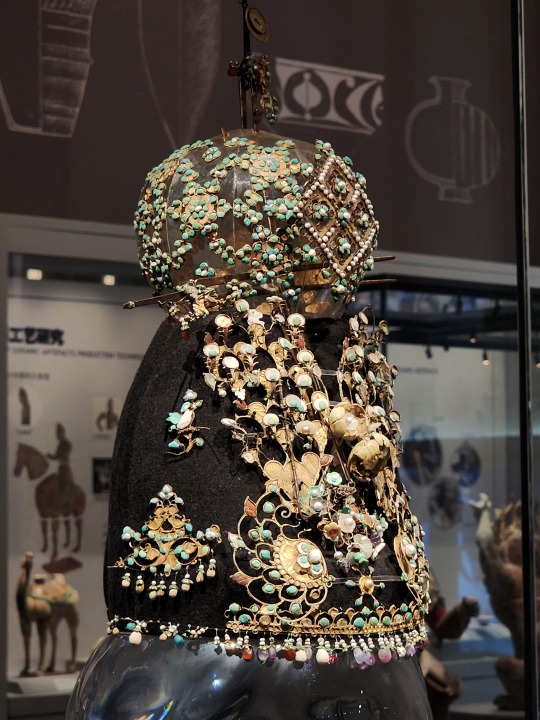
And it wasn't just a crown either. There were other pieces that were part of her outfit:
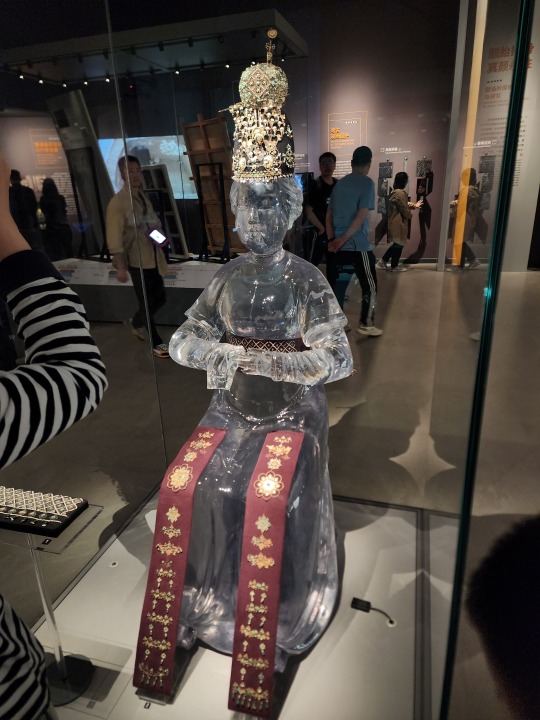
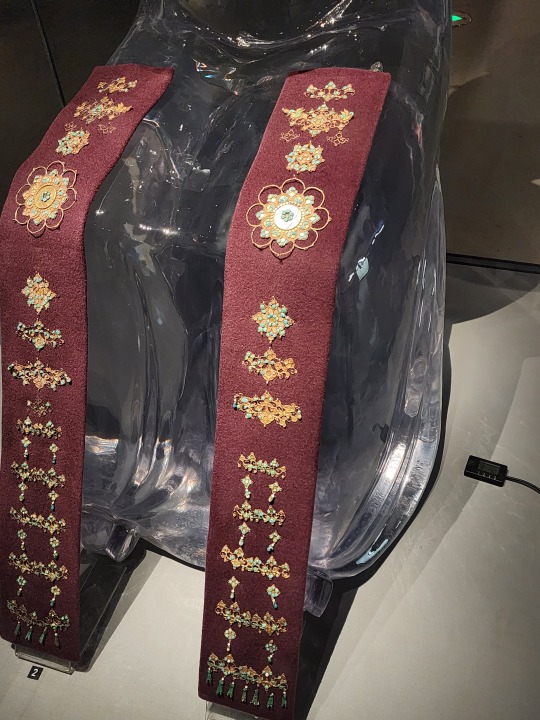
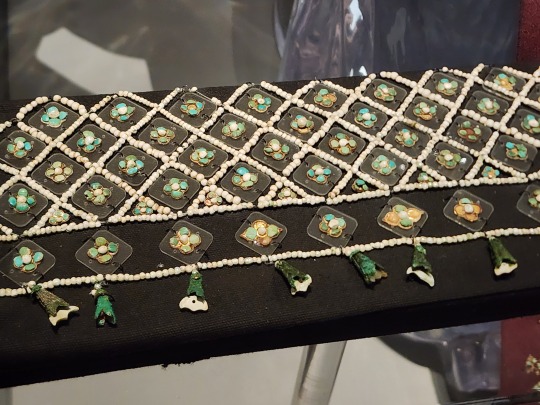
Various Tang-era gold and silver thread embroidery pieces found in the crypt of Famen Temple/法门寺, the plaque is visible in many of these so I won't be naming them all. There's a saying among Chinese archaeologists: "dry things last a thousand years, wet things last ten-thousand years, half-wet half-dry things last half a year" ("干千年,湿万年,不干不湿就半年"). This refers to the conditions the artifacts/remains were in over time, stable conditions usually preserve artifacts and remains better than changing conditions. Fabric-based artifacts are notoriously hard to preserve, especially in Xi'an's "half-wet half-dry" climate, so these are a rare sight:
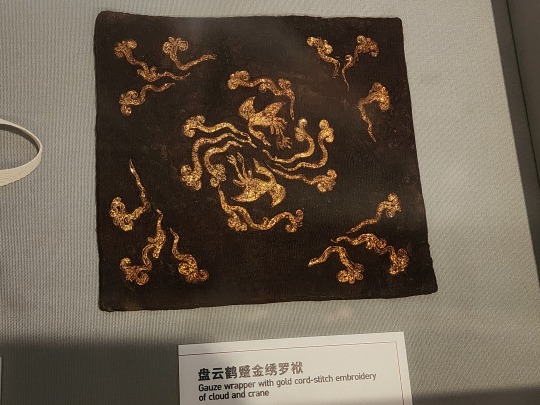
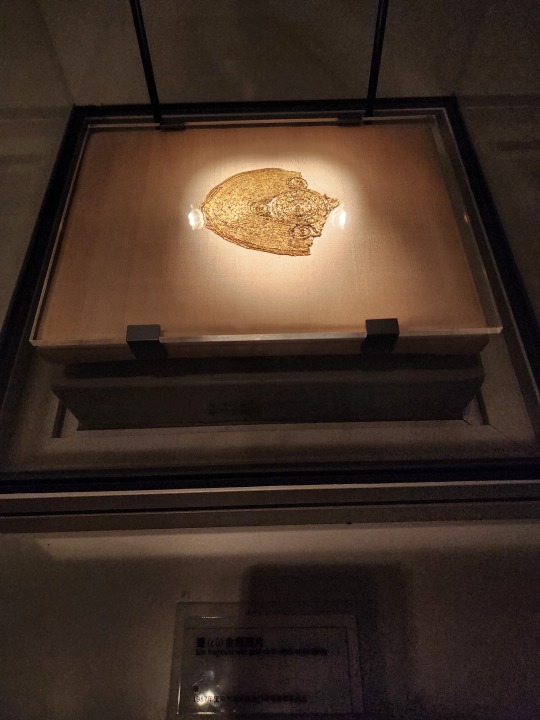
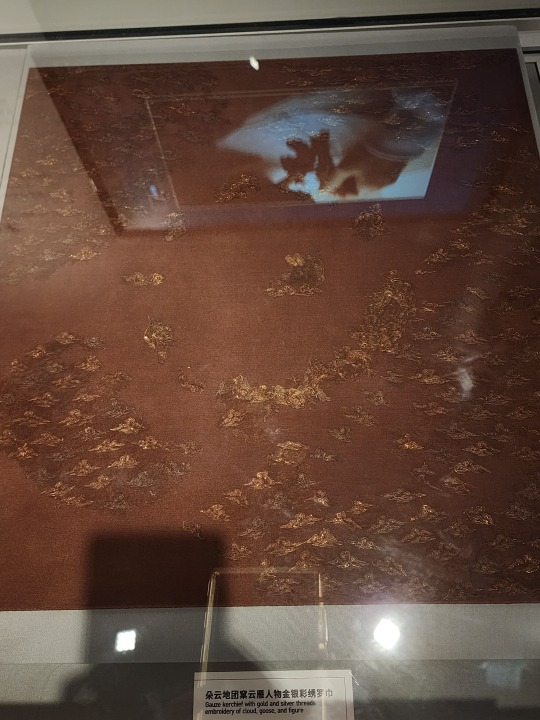
Note that the bird and flower design on the right is actually not an embroidery, but designs woven straight into the fabric:
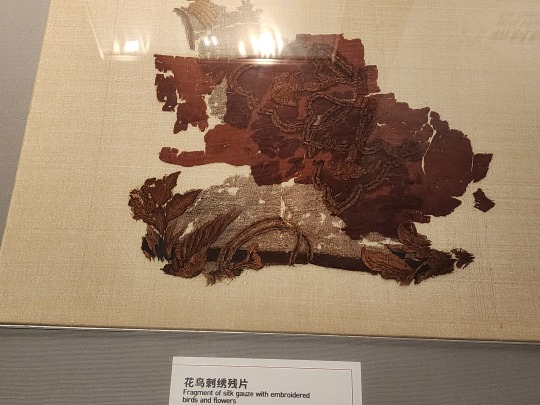
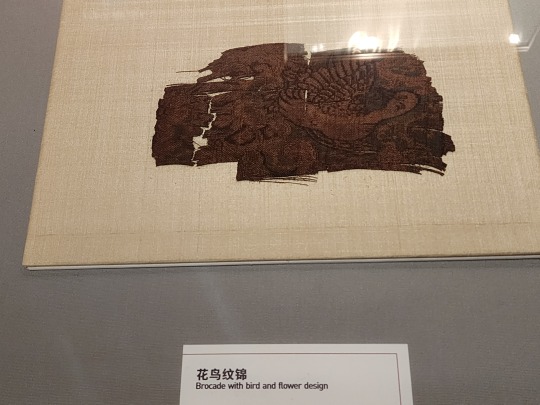
The gold threads used in these embroideries were made by wrapping long strips of gold foil around thread through the turning of these hook-shaped tools.
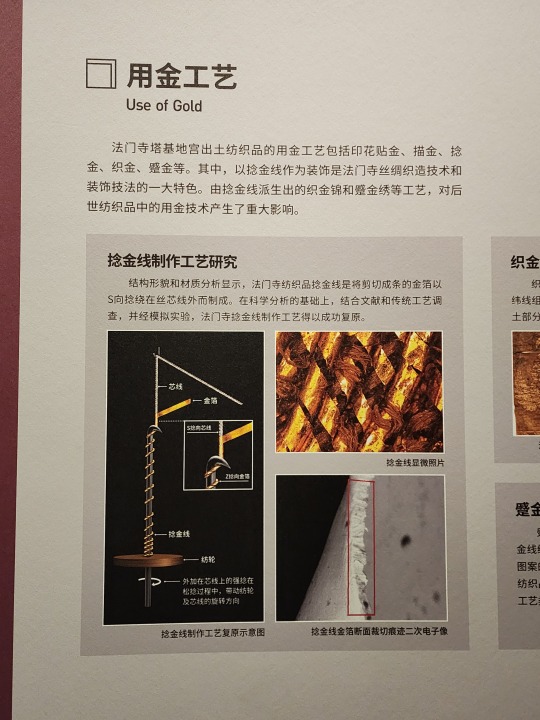
The gold threads produced from the above process were mainly used in two ways, either woven into the fabric (top), or embroidered onto fabric (bottom). The kind of embroidery here is called cujinxiu/蹙金绣, which uses gold threads and a technique that is similar to couching
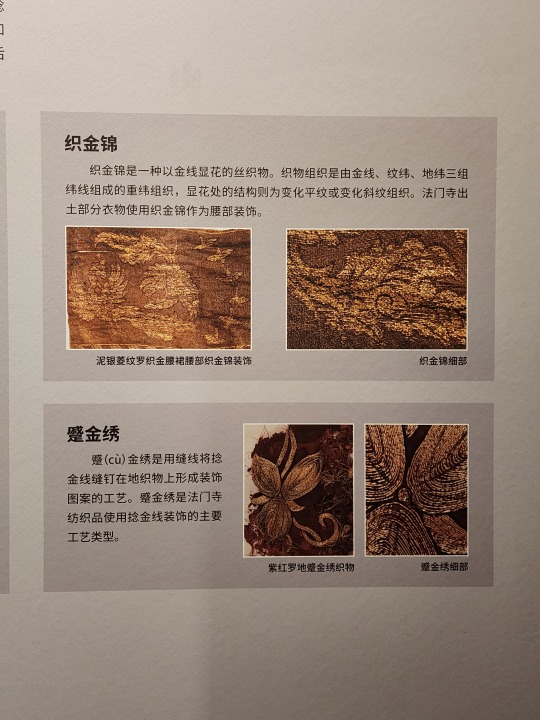
Models of the microscopic structure of different types of silk fabric found in Famen Temple. In common usage today, the term sha/纱 often refers to light, almost see-through polyester fabrics, but in the past this term refers exclusively to a type of light silk fabric. However, the other ones listed here (ling/绫, luo/罗, juan/绢, jin/锦) almost always refer to silk fabrics.
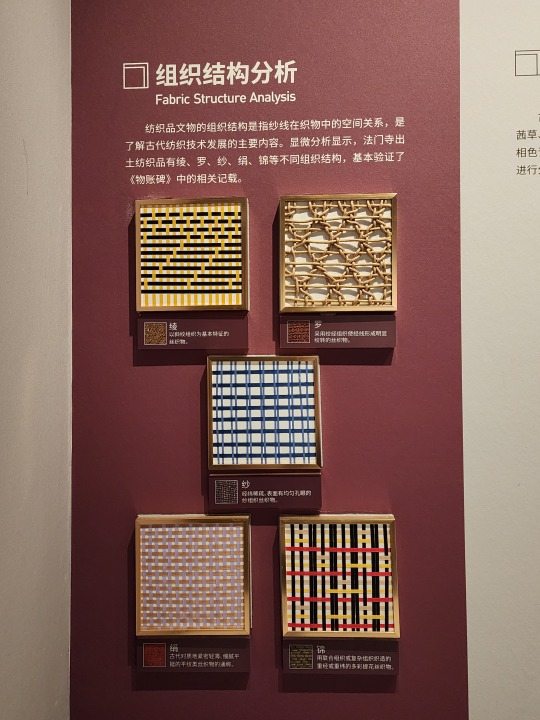
Different types of motifs/patterns found on artifacts throughout time. Left is the evolution of juancaowen/卷草纹 ("curled plant motif") from Tang dynasty to Jin dynasty (1115 - 1234). Right is the evolution of lianhuawen/莲花纹 ("lotus flower motif") from Northern Song dynasty (960 - 1127) to Yuan dynasty (1206 - 1368).
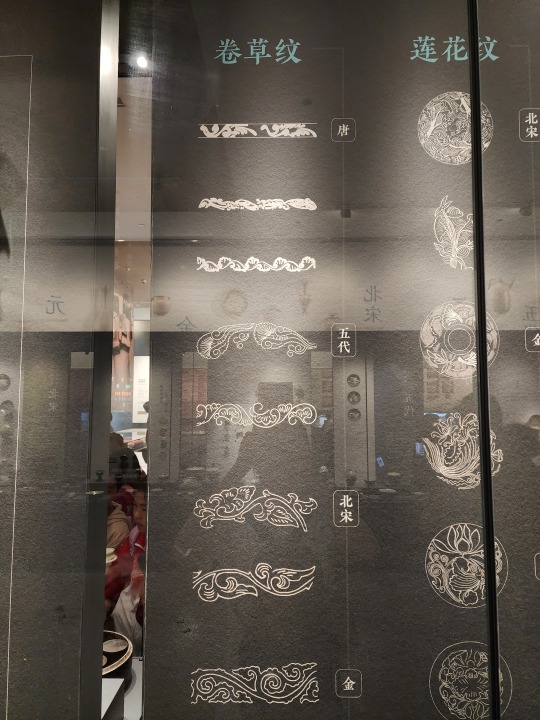
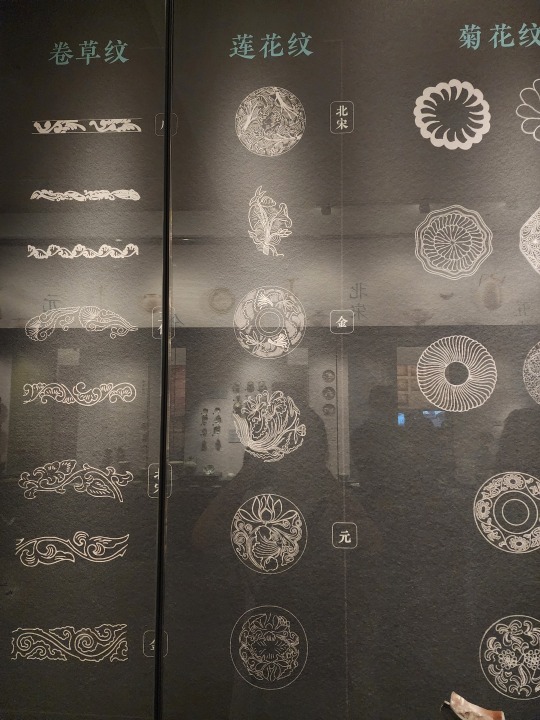
Left: evolution of juhuawen/菊花纹 ("chrysanthemum flower motif") from Tang dynasty to Yuan dynasty. Right: evolution of mudanwen/牡丹纹 ("moutan peony motif") from Tang dynasty to Yuan dynasty, and the evolution of youyuwen/游鱼纹 ("swimming fish motif") from Northern Song dynasty to Yuan dynasty.
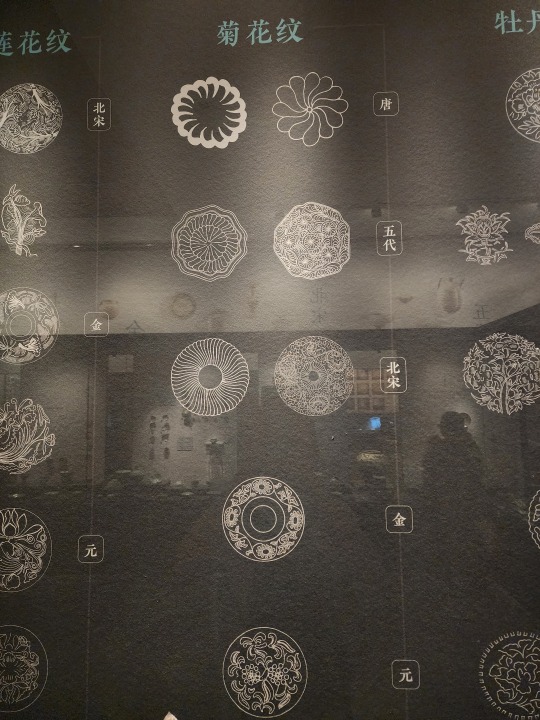
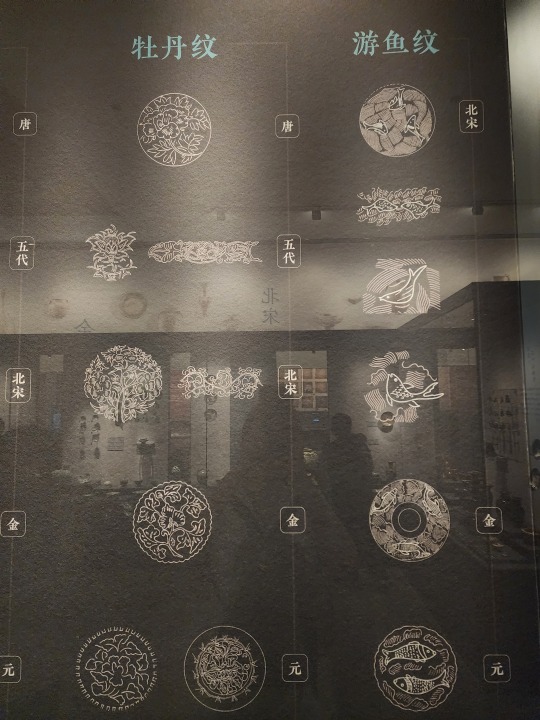
This is another one of my personal favorites, a Ming dynasty (1368 - 1644) bronze vessel with cloisonné enamel (called 掐丝珐琅 or jingtailan/景泰蓝 in Chinese). This type of vessel is called a gui/簋.
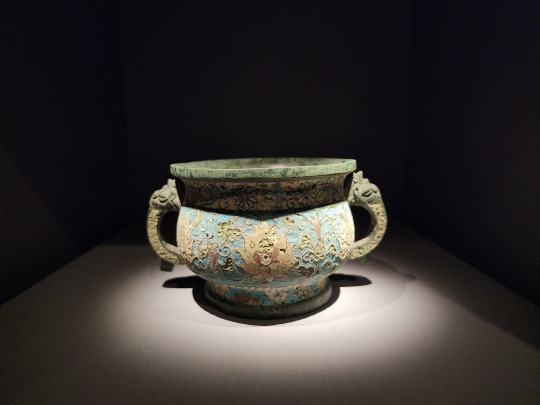
Song-era green-glazed porcelain from Yaozhou Kiln Site (耀州窑), so it's called yaoci/耀瓷 for short. This particular style is made by carving designs onto the piece before glazing and firing. I have attempted something similar when I took that wheelthrowing class years ago, but I failed lol
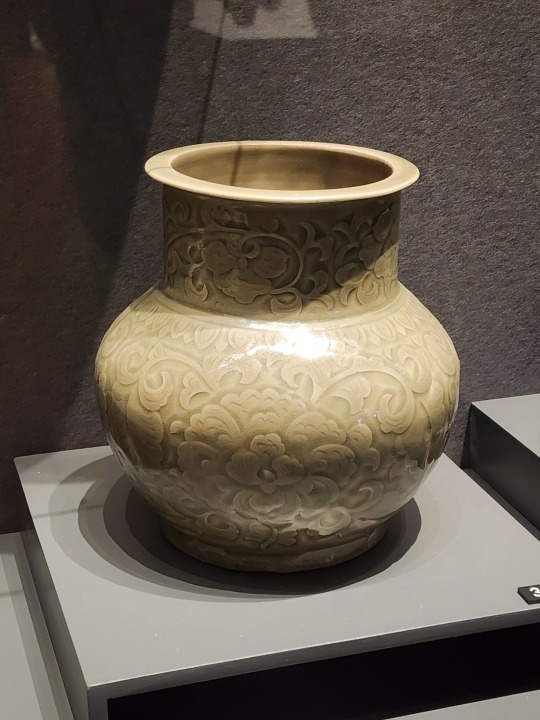
A Northern Song-era stone dui/敦 from the tomb of Lü Dalin/吕大临. The calligraphy here is in kaishu/楷书 script.
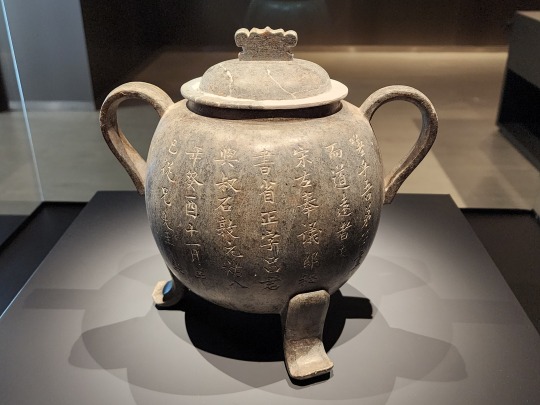
Also from the tomb of Lü Dalin, the left is a wine flagon with a dedicated holder used to warm the entire vessel along with the wine inside. The right is a incense burner with a swastika on top. Note that swastikas are very common in Chinese Buddhism, and is taken to mean "myriad" or "infinity" (the swastika is pronounced wan/萬, which literally means "ten-thousand", the figurative way of saying "infinity" in Chinese).
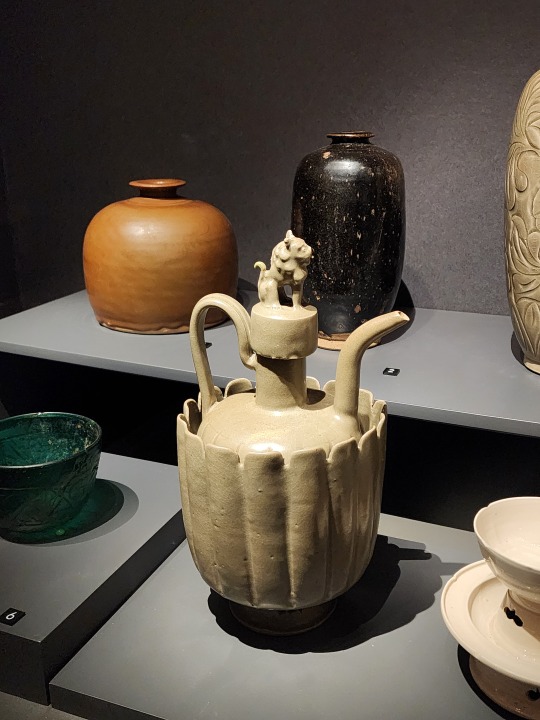
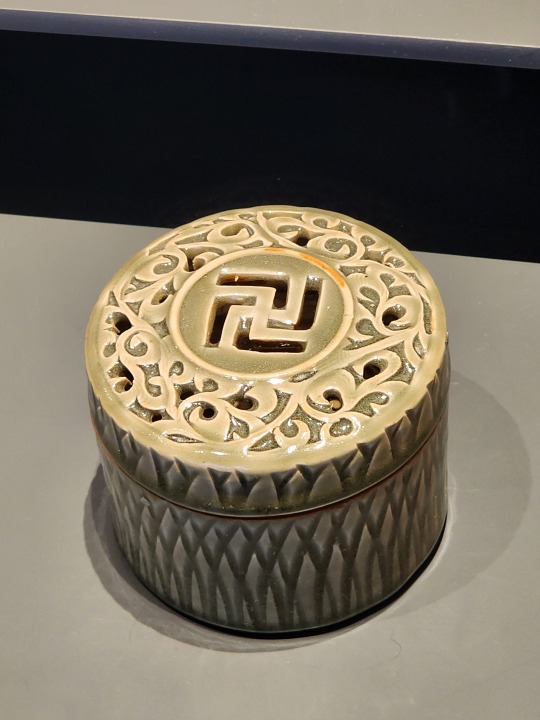
The process of making tea in Song dynasty, called diancha/点茶, which generally involves these steps: grinding the tea into a powder, sifting the tea powder, putting tea powder into a tea cup, pouring in hot water, and whisking the tea with a chaxian/茶筅 to create a light foam before drinking. In Song dynasty, the literati would hold contests among themselves to see who could make the perfect tea using the diancha method. This complex and time/effort consuming method was gradually phased out within China by the time of Ming dynasty, but deeply influenced Japanese tea making methods.
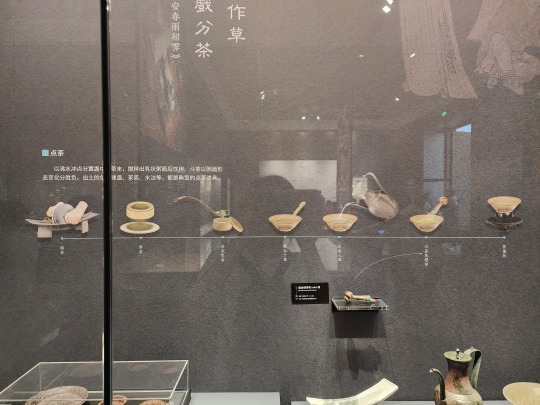
Left: a small porcelain piece depicting a mother lion and cub. The Chinese depiction of lions, called shi/狮, largely comes from a combination of the mythological suanni/狻猊, and the rare real lions that were given to China as gifts in the past. Right: a pottery dragon from Yuan dynasty, if I remembered correctly.
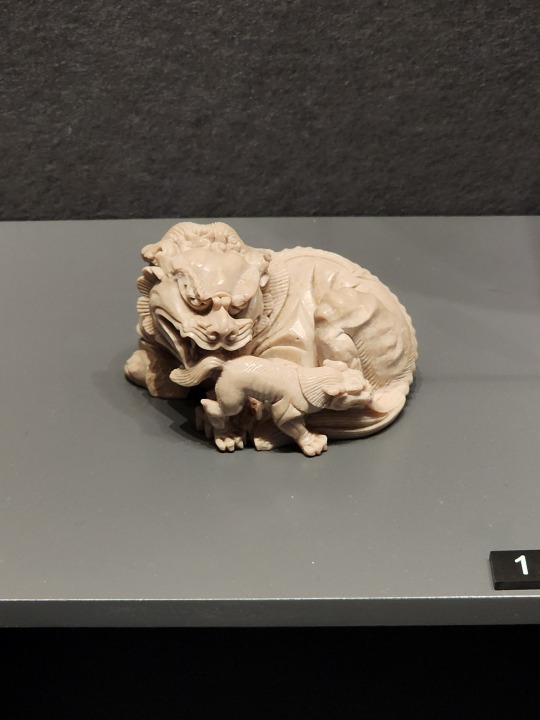
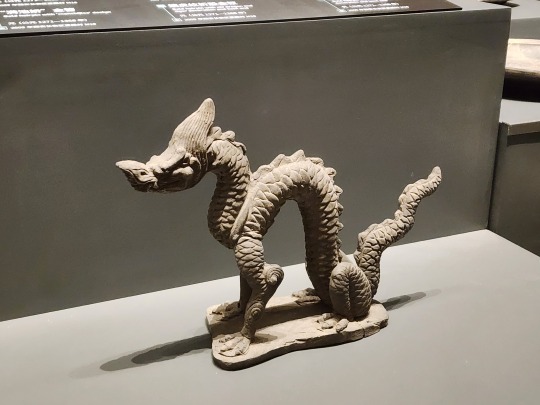
Also the previous part on Han dynasty (202 BC - 220 AD) artifacts was getting way too long, so I put these two pictures here at the end. In ancient China, many round coins had a square hole in the middle, and these holes were used to string the coins up for easier storage and counting. Such strings of coins are called minqian/缗钱, and this is why the quantifier for coins in ancient China is usually chuan/串, guan/贯, or diao/吊. In usage, chuan is not a strict quantifier, but 1 guan or diao = 1000 coins.
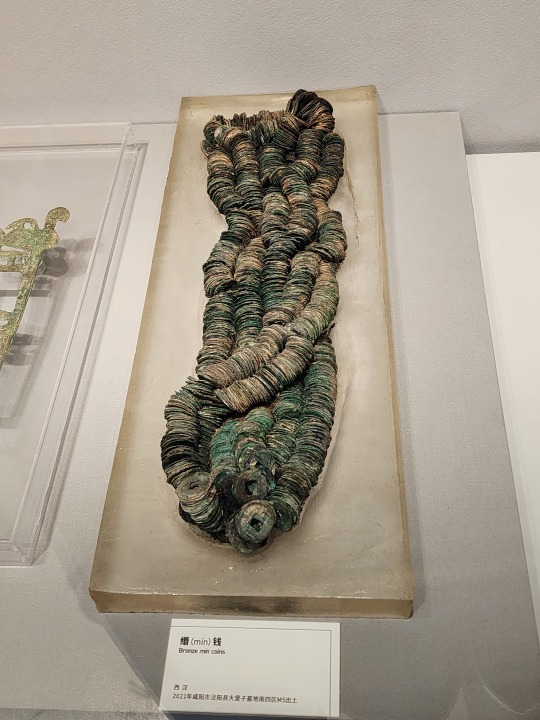
A modern recreation of a Han-era painted lacquer box, this red pattern on black background look is very characteristic of Han-era painted lacquerware:
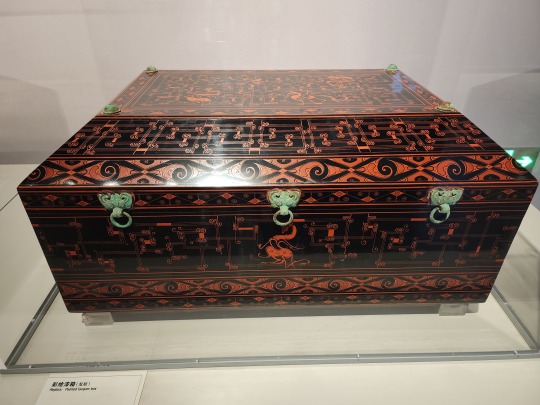
Painted pottery statue of a Buddhist deva:
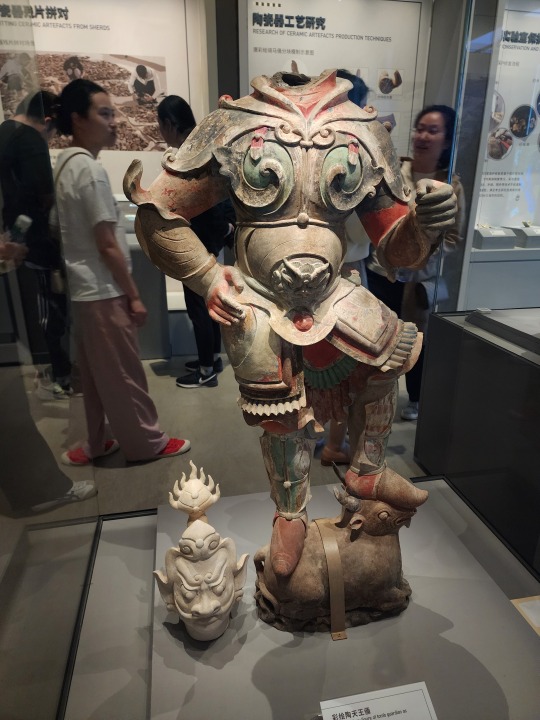
The painted wall murals of a Yuan dynasty tomb, viewed from below:
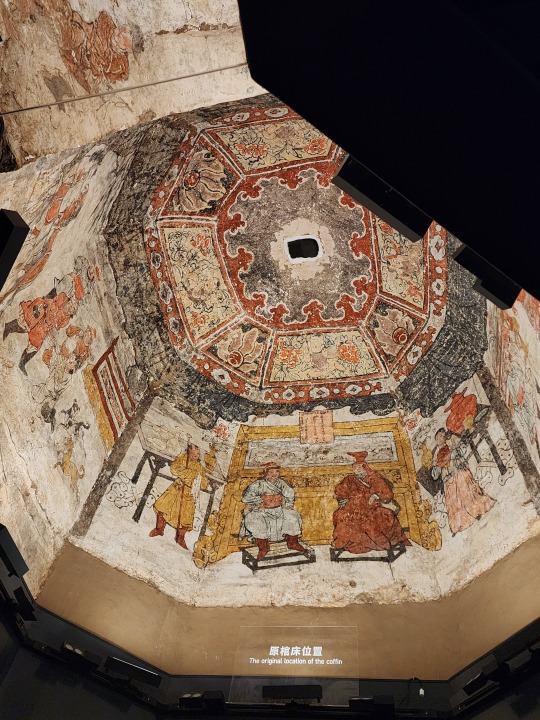
And this concludes the posts for Shaanxi Archaeology Museum! The next museum (also the last one) will be Shaanxi History Museum, specifically the new Qin-Han dynasties museum.
#2024 china#xi'an#china#shaanxi archaeology museum#chinese history#chinese culture#chinese hanfu#hanfu#chinese calligraphy#tang dynasty#song dynasty#jin dynasty#yuan dynasty#ming dynasty#embroidery#calligraphy#history#culture#archaeology
153 notes
·
View notes
Text
when the sea calls for three | intro
Paring: Azriel x Reader x Eris
Word Count: 1.5K
Summary: In the aftermath of war, peace reigns over the realms of Prythian, but the delicate balance hangs in the hands of two unlikely mediators—You and Lucien. As the newly appointed Emissaries of Peace, your duty is clear: maintain alliances, foster understanding between courts, and navigate the intricate webs of fae politics.
But when fate deals an unexpected twist, revealing that you possess not one, but two mates, the tranquillity you've worked so hard to uphold is suddenly threatened. Caught between two males who refuse to share, you find yourself thrust into a precarious position, torn between duty and desire.
What will you do and who will you choose?


I need you.
Those three words were all it took.
༄
In the soft glow of the morning light filtering through the room, flickering reflections of pinks and purples across the walls. Dawn Court had always been radiant, the sky, cobalt and rose. A sunrise all day long. You were proud to call it your home.
You stood before the ornate mirror, fingers delicately adjusting the intricate buttons of your tunic.
The decision to choose neutral clothing had been yours, a deliberate choice born from the realisation of what your new role weighed. You were to be a mediator, a peacekeeper, it only seemed fitting to don a uniform that symbolised your neutrality and dedication to maintaining balance among the realms.
The fabric shimmered with a subtle elegance, adorned with delicate motifs that whispered of the courts you now served. The tapestry of symbolism spoke something that words could not, of a new beginning, a new chapter– a time of peace.
The design along the back of your tunic, three majestic mountains rose proudly, their peaks reaching towards the heavens. Behind them, the sun emerged, casting its golden rays that spread warmth and light– a nod to your home.
In the left above, a fully fleshed sun beamed down upon the mountains, radiating its brilliance and vitality. To the right, three stars and a crescent moon were sewn with meticulous care, representing the rest of the solar courts and their celestial splendour.
On your left sleeve, leaves were hand stitched along your cuff, bronze thread danced in a graceful swirl, climbing upwards towards your elbow, mirroring the silver icy shards that adorned the right sleeve. Autumn and Winter in perfect harmony.
Around your collar, a delicate pattern of vines and roses intertwined, symbolising the beauty and vitality of the Spring Court's bloom. And along the trimmings of the tunic's bottom, waves swirled in a mesmerising dance, evoking the Summer Court's boundless energy and fluidity.
Your tunic jacket cascaded gracefully, halting just at your hips, while beneath it, a long, flowing cream pleated skirt billowed elegantly to the floor. With your hair initially draping freely, you gently pulled it forward, ensuring the intricate details adorning the back of your tunic were given their rightful moment to shine.
As you smoothed the fabric, you couldn't help but feel a sense of pride in the role you had been given. Playing a bridge between courts, and worlds. A mediator between the people.
Politics had never really been something you relished in, but you were good with people, and good with your words. Qualities that your friend desperately convinced you, were integral to this role.
A soft knock on the door interrupted your reverie, and you turned to see Lucien, your friend, standing in the doorway. His mechanical eye wiring at the sight of you. He was wearing a similar tunic, one that was longer on his body but mirrored the designs of your own.
It was Lucien who had told you he needed you.
I need you.
He had written to you one evening. His correspondences were usually lighthearted and filled with friendly banter, but this weighed heavily in a way that was so unlike him.
“I could really use your help.” Lucien had breathed, when you came to visit after his letter.
I need you. I need my friend. I need someone to lean on. I need someone to laugh with. It’s been too long. I miss you.
Was what you heard. His message had been simple yet poignant, a plea for assistance and companionship.
You had always had a way with words and sounds. Understanding the gaps in between the breaths, the underlying emotions and intentions woven into each syllable. Most didn't realise what could be revealed in their words. How the octaves and melodic tones of their tongues sung of unspoken truths.
Lucien and you had shared a friendship that spanned many years, reaching back to your earliest memories of childhood. As children and teens, you had been inseparable, playmates in a time that now felt like a distant memory. However, when borders grew stricter and tensions mounted, those days were abruptly halted.
It wasn't until the dark days of Amarantha's reign that fate brought you back together, through the intervention of Nuan, a mutual friend. She was a skilled Alchemist of your court, who had aided Lucein in his healing, crafting his beautiful golden eye. And because he was no longer a part of Autumn, you were able to reconnect and your friendship flourished, even if it was predominantly through ink and parchment.
"Ready to face them?" he asked with a tight smile, his voice carrying a note of anticipation.
I’m nervous. Is what you heard under his words.
You returned his smile with a nod, a playful glint dancing in your eyes. “Of course, I was born ready Lucie” you replied, effortlessly flicking his nickname with a casual ease.
Despite having a smart mouth now, Lucien was a name you often got tongue-tied in your younger years. Lucie had been a much easier sound to make, and you didn’t hesitate to use the endearing name when wanting to tease.
Lucien rolled his eyes, but your casual demeanour softened the nerves that had laced his previous words. That had been your intention.
Just one example of how your intuition always left you saying the right thing. Of course there were times this didn’t happen, but those occasions were extremely rare.
“We should decide which courts reside under our care before the meeting” Lucien began, striding in front of the mirror to adjust his own tunic. “And I have to say you’ve made more progress with Tamlin these past two months than I have in the past year," Lucien breathed, a hint of admiration in his voice while he smiled at you through the mirror.
You raised an eyebrow, a smirk playing at the corner of your lips. "What, like it was hard?"
Tamlin's stubbornness had been a challenge, but your natural charisma and persuasion had proven effective in bridging the gap between his court and the others. His residents had at least started returning home, and thanks to your work, there was actually something for them to return to.
You huffed, before turning your friend around, pulling at his collar to adjust. Before tidying up his long auburn hair.
"I can’t do both though Lucien. I'm not dealing with your brothers and Tamlin. That's too much, even for me” You remarked.
Lucien’s relationship with his brothers remained strained, the scars of their shared trauma running deep. Despite Beron’s demise, Eris was now Autumn’s High Lord. The brothers wounds were not so easily healed, and the weight of their history continued to cast a shadow over their interactions.
“Plus I do believe some forced proximity may do you and Tamlin some good” you pointed a look at him, referencing their damaged friendship.
Lucien bit the inside of his cheek, his eyes narrowing at you. He couldn’t help but envy how effortlessly you seemed to navigate the complexities of every situation, every conversation. Always knowing the right words to say, and the right actions to take. Qualities that had undoubtedly drawn him to seek your assistance in the first place.
Qualities he forgot he would also be susceptible to.
"I'll look after Autumn and your hotheaded brothers. You deal with the depressed blondie," you suggested, a mischievous glint dancing in your eyes.
"Fine," Lucien conceded, begrudgingly acknowledging the wisdom in your words.
“I want Dawn, it’s my home and Thesan would be heartbroken if I wasn’t his courtier,” you asserted confidently.
"Then I'll have Day," Lucien negotiated, a hint of determination in his tone.
As the conversation turned to the remaining courts, you paused, considering the options carefully. The Night Court held a particular significance for Lucien, given his mate's presence there, but you were keenly aware of the tension that still lingered between them.
"I can take Night if that helps. I've already been the one updating their Spymaster recently anyway," you offered, your voice steady as you finally finished straightening up Lucien. Pulling your hands swiftly behind your back.
He mirrored your pose "Then I will manage Winter," Lucien conceded, a sense of resignation colouring his words. He wasn’t very fond of the cold, but neither were you.
But he was happy to take this one for you, as you had taken Autumn and Night for him.
"Summer is mine. You can have the humans, your Band of Rejects or whatever they're called," you remarked playfully.
"Exiles," Lucien corrected with a humorous purr, a brief flicker of amusement softening his eyes.
“Apologies…band of exile…-d rejects” you humoured, before you felt him nudge you with his shoulder.
Your soft laughs filled the room before you tilted your head to look at your dearest friend “Look at you now. Exiled no more. Mr. Emissary of Peace”
Lucien smiled proudly at the title, he had come a long way. This new chapter for Phrytian was daunting, but he was grateful to have you by his side “You ready?”
With a nod you grinned wide “Let’s go peacekeep the fuck out of them Lucie!”

Next Part >>

a/n: Eeeekkkk so here's a little intro to set the tone and roles! Just a little disclaimer, there will be a few things in this series that haven't happened in the books, but it works for the plot. Only small things, so just go with it please! Excited to share this story with you all <3 - Lottie x
#acotar#azriel x reader#azriel x you#acotar azriel#azriel fanfic#angst#acotar fanfiction#acotar series#azriel shadowsinger#azriel spymaster#eris x azriel#eris vanserra x reader#eris vanserra#eris acotar#eris x reader#eris x reader x azriel#eris x y/n#eris x you#azriel x eris
363 notes
·
View notes
Text
:D
OG

My version

16 notes
·
View notes
Text
Things I've noticed in my own playthrough of Indigo Park:
(spoilers of course)
The gear for the first generator puzzle drops down through a hole in the ceiling once the puzzle is activated. Not sure if there's a way to see who dropped it.
In the corridor after the tunnel collapse, two portraits are torn down. I assume these are Lyoid and Salem
Cameras follow you. Not that surprising on its own BUT one of them is behind the stage where Rambly claims he can't see you!! The camera is active and tracking you, so did Rambly lie or is someone else controlling some of the cameras?
The train being pink is interesting, since that seems to be more Salem's color? But there are other posts and art of Rambly on the train so maybe I'm grasping at straws.
In Lyoid's area, there's a bronze statue of Lyoid among the crates, reminiscent of of the one of Rally and Mr. Indigo at the park entrance, further evidence for the theory that Lyoid either used to be or was planned to be the star
Salem's potion was turning the squirrels evil/dangerous, yet two of the purple squirrels in the background were in love and didn't aggro the player. WILL LOVE WIN??
Also if you haven't looked up secrets vids I recommend doing so if you're interested. There's an appearance from Mollie and one from Finley that the LPers I've watched have missed.
269 notes
·
View notes
Note
for mint
isn’t it suspicious that your allowed to have a knife-? If someone dies by a stab wound, aren’t you suspected?

(Mint is rarely suspected, but when he is it’s by Bronze!!)
3 notes
·
View notes
Note
apollo, more apollo or lester please???? without conditions or anything specific just apollo thank you, you write him so well
is the tune of my heart, can you hear it? ♪。・:*˚
— apollo x fem!reader
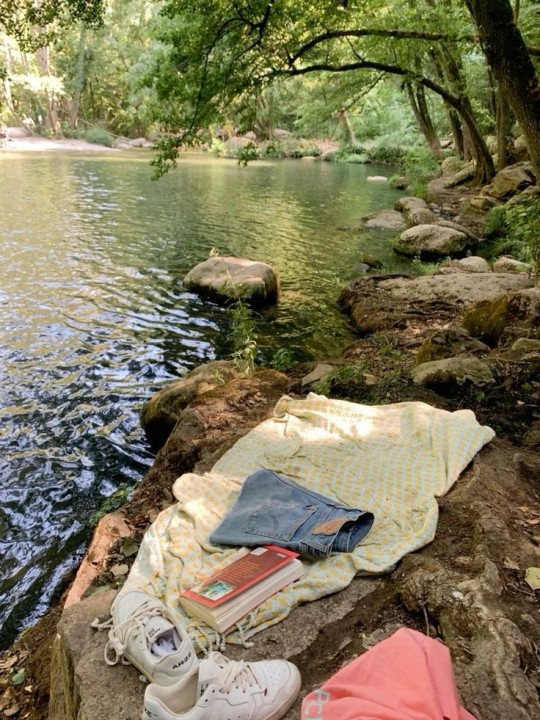
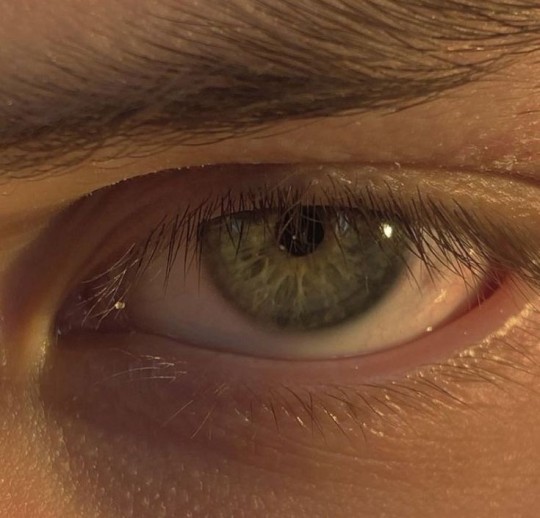
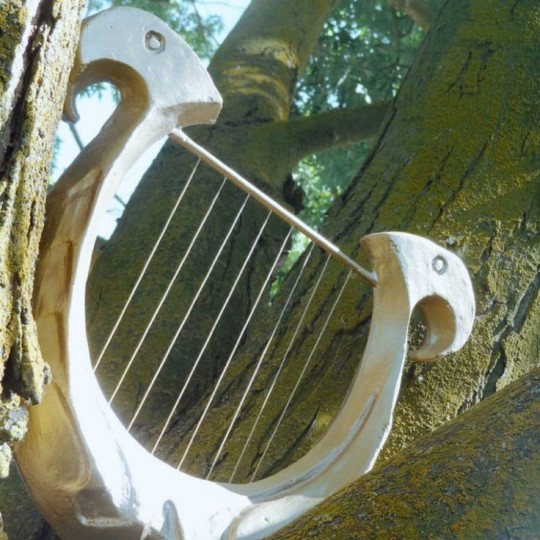
warnings: none
a/n: hi baby, thank you for you sweet sweet SWEET words. don't worry, heres your girl. enjoy bby.
✧
You felt like a real nymph. You know, those ones sitting by the rivers on a rock with the water trickling over their toes and the sun bathing their skin, but mostly for the company they used to have. You glanced over, and even though he was still focused on his thing – pursing his lips and grumbling – you thought he'd never looked better.
You wondered how you ended up like this and fixed your gaze on the way the water bounced the light. It was funny because Apollo used to boast so much about how handosome he looked that you ended up trying to avoid him, even disliking him (nothing new among other campers), but now he was definitely a new person.
Lester or Apollo, whichever name he preferred, now presented himself with less pretense, and the simplicity of both his appearance and attitude seemed ten times more attractive.
He let his golden curls mingle with the chestnut ones, kept those eyes as blue as the sky, and toned down the exaggerated muscles for a more athletic body. You knew he had truly changed when he left some of the scars he had acquired during his quest, setting aside the perfect texture of his skin.
You hugged your knees and felt the urge to sink into him; his beauty was so ethereal that you resisted reaching out to confirm that he was real, that he was indeed beside you, creating beautiful sounds with the lyre and that you weren't delusional. He was like a dream, he was a dream. God, you could think about that all day.
Do, re, do...
His eyes were fixed on every note he made resonate on the instrument, as if he feared making a mistake, as if he weren't the god of it all.
Totally distracted, his hair began to cascade like a curtain of gold and bronze. You leaned in gently, and before you knew it, you were already running your fingers through his hair behind his ear. He immediately looked up at you, and the tension in his gaze eased, almost you could see a smile. Were you that remedy for him as he had become for you?
— Darling — minutes had passed in silence before he said it just audibly, the sun beautifully lit up his eyes, leaving you breathless. His hair brushed against your fingertips back, resisting being contained, or maybe, that small gesture was enough to make you lose the strength to take something as light as that. You just smiled at him.
You were good friends, but you no longer felt that way, how is it possible to fall in love with a god? If that was one of the views their ex-lovers had, now you understood all the parents of Apollo's cabin children. Ugh, you felt bad for having that thought and hugged yourself again as you watched him return to the lyre.
— This melody...— he said, breaking the silence, —it always comes out better when I'm in love.
You rested your head on your knees as you tightened your grip on them.
— But it sound beautiful.
And he nodded with a radiant smile. Wait, was he in love?
— Oh,— your disappointment choked you, and you raised your eyebrows pretending interest. — Who is it?
Apollo closed his eyes, letting out a laugh, shaking his head mockingly as if it were obvious and you had to know the answer. That annoyed you, how the hell were you supposed to know who he was in love with if he could be there and in Alaska at the same time?
— You're hopeless, aren't you?— He left the lyre by his side, and it was his turn to crawl towards you. You lowered your gaze, watching as the lake snaked, you could almost see your chances being dragged away by it. He touched your shoulder to get your attention, and you wanted to resist, you didn't want to see him, it was embarrassing.
— What? — you snapped.
— You get in a bad mood so quickly — he teased, affectionately taking your hand, making your heart race even though you knew it wasn't uncommon for him, that's just how he was, so you just sighed. He smiled, trying to find your eyes as you avoided them, then he leaned back and directed your hand to his cheek for you to cradle him, Apollo didn't stop pleading until you looked at him. — It's been better since I met you.
You returned your gaze to him, confused. How could he say that so calmly and with those sparkling eyes? Damn the way he looked at you, you wanted everything from him.
Apollo kissed your knuckles and traced your arm with small kisses, when he started laughing, he stopped to look into your eyes once more.
You weren't a nymph, to him, you were a goddess.
— And do you love me? — he asked, innocently.
You knew the answer.
#maría's shared dreams☆。゚✧#trials of apollo#pjo hoo toa#apollo x y/n#apollo x you#apollo x reader#apollo#riordanverse#percy jackson#pjo#lester papadopoulos x you#lester papadopoulos x reader#lester papadopoulos#lester papadopoulos x y/n#lester x reader#lester x you
174 notes
·
View notes